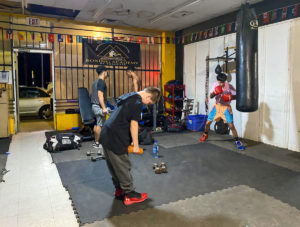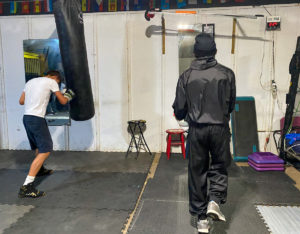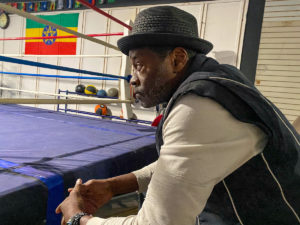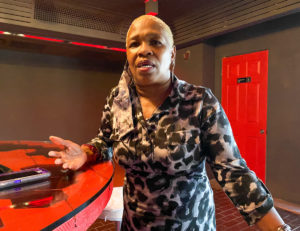
At the end of run-down strip mall on Clarksville Pike, a small, makeshift gym is filled with kids lifting weights and throwing punches.
This is no state-of-the-art boxing gym. The ring is duct-taped together and squeaks as boxers bob and weave. The water-stained ceiling is literally falling in.
 Samantha Max WPLN News
Samantha Max WPLN NewsCeiling tiles are stained from water damage at the International Boxing Academy of Nashville.
“To be honest with you, there are a lot of people afraid to come into this facility,” Randall Venson says, the pitch of his voice rising in near-disbelief. “They’re afraid to come into to this facility, I kid you not.”
Venson is one of the recipients of a new city grant program that’s giving $5,000 to small organizations working to keep communities safe. He opened the International Boxing Academy of Nashville four years ago, after spending decades as a boxing coach. The nonprofit gym trains both pros and up-and-comers — anyone who’s looking for a refuge.
Sometimes, Venson doesn’t know why he still shows up every day. The 61-year-old’s hair has gone gray. He says he has spinal stenosis, arthritis in his back and his neck, and a torn rotator cuff.
“I’m so beat up, and I get so tired of coming in this gym sometimes. But I keep doing it every day,” Venson says. “If somebody needs me, ‘Coach, can you be at the gym this Saturday? I really need you to be there.’ I’m here. I have no life other than this. But it’s worth it.”
 Samantha Max WPLN News
Samantha Max WPLN NewsBoxers jump rope and practice their punches at the Bordeaux training gym in October.
Venson is more than just a boxing coach. He’s a father figure. A mentor. A former social worker who wants to teach young people not just how to box, but how to think. With the Metro grant money, he’s getting ready to start teaching anti-violence classes.
Maybe it sounds ironic for a boxing coach. But Venson says when people feel confident in their ability to defend themselves, they don’t need to pick up a gun. The class will go beyond the lessons Venson teaches in the boxing ring and use tools from his years as a social worker to help kids think through their decisions before they resort to violence.
“You can use your mind to defend yourself. The art of fighting without fighting,” he says. “The mind is a powerful weapon if you use it right.”
Since opening his gym in 2017, Venson has been paying out of pocket for the weights and the jump ropes and the rent. He doesn’t even have health insurance.
The $5,000 from the city will help. But he says it’s not enough.
“What could $5,000 possibly do for me? I couldn’t even rent a room for a month,” Venson says. “I want to teach. I can’t teach kids in this gym.”
‘We need a lot more’
This year, Nashville set aside about $2 million for nonprofit groups working to prevent violence, initially giving $5,000 to 21 groups. More money will be allocated later.
The new line item in the budget comes at a time when shootings are spiking, both by residents and by police.
Homicides are up compared to last year, which was already far higher than average, with a 41% increase over 2019. Eight people have also been shot by Nashville police this year — six fatally — and two others shot themselves during encounters with officers. That’s the most shootings in a year since the department started tracking deadly force incidents in 2005.
 Samantha Max WPLN News
Samantha Max WPLN NewsRandall Venson watches his boxers practice one evening in October.
The city grants are supposed to make communities safer without relying solely on law enforcement. But some recipients, including Venson, doubt the city is really committed to policing alternatives.
“Hell, no. No, they’re not,” he says. “How can you be dedicated to addressing the problem when you’ve got politicians never even been to this gym?”
Officials say the $5,000 grants are just the first step in a long-term plan to support community-based public safety programs. First, small groups are getting small grants. Then, bigger groups will get bigger injections of cash.
The $2 million pales in comparison to the more than $240 million that went to the police department this year. But the funding has already come under scrutiny after a News Channel 5 investigation raised questions about a group vying for one of the larger grants.
“Money is never the object of buying your way in or out of anything,” says Ron Johnson, the city’s new community safety coordinator. He says money, alone, can’t solve the problem.
 Samantha Max WPLN News
Samantha Max WPLN NewsRon Johnson spent years as a mentor and grassroots community organizer before joining Metro as the city’s first community safety coordinator.
Johnson knows what it feels like to lose a loved one. His mother was murdered, and he’s said that no amount of money can make up for a lost life.
When it comes to community-based safety, Johnson doesn’t want to focus on the dollars. His goal is to build a “village” of organizations that can work together to curb violence.
“I just think that, you know, the money will help at any time, in any phase, regardless of what the amount is, because from zero to a dollar is more than zero,” he says.
But when the Metro Human Relations Commission pressed him about the small size of the grants compared to the police budget, Johnson said he wished the city had devoted more money to community-based safety.
“If it was up to me, yeah, it should — we need a lot more,” he told commissioners. “But it’s what we have, and I think we have to work with what we have until we can prove that we can get it done.”
Tired of waiting for help
Clemmie Greenlee feels like she’s been proving she can get the job done for 20 years. She’s been holding rallies, counseling kids and supporting grieving families since the early 2000s, long before the city was offering any monetary assistance.
Greenlee is glad Metro is finally doling out some support. But she says $5,000 is not nearly enough.
“$5000 — time I paid for one kid to even get in a program, pay for printing, my ink, my gas, the rent on a building that I’m trying to rent, I’m done,” she says. “I’m done, and it ain’t even January the first yet.”
Greenlee was inside the mayor’s office when she found out her nonprofit, Nashville Peacemakers, would be receiving just $5,000.
 Samantha Max WPLN News
Samantha Max WPLN NewsClemmie Greenlee, founder of Nashville Peacemakers, wants the city to dedicate more money to grassroots groups working to stop violence.
“And I got up and told him, ‘Take that check and stick it up they a**,'” she says. “I was there at the table when they told me what I was getting, and I said, ‘I don’t want it. As a matter of fact, I’m gonna go home and bring you $5,000.’ ”
Nashville Peacemakers provides tutoring, trade classes and mentorship for kids and teens. She also runs a support group for moms who have lost children to gun violence. When someone gets shot in Nashville, she’s often one of the first people to get a call.
For Greenlee, just like for Johnson, the issue is personal.
“My son was murdered in 2003. My nephew was murdered in 2014. My grandson was murdered in 2016,” she says. “I have no business still sitting here talking about youth violence, gun violence, gang violence.”
Greenlee has one grandson left. He’s 19. And every night before she goes to sleep, she wonders if she’ll wake up to a phone call telling her he’s gone.
In the two decades Greenlee has been doing this work, she doesn’t feel like much has changed.
“Because the right people won’t listen, the right moneys won’t let us in the door and the right grants that know that they can help us, with the right buildings that we need to show them how we can shut this down won’t give it to us,” she says.
With all her community connections and years of experience, Greenlee thinks she could make a real dent in Nashville’s violence epidemic — if someone would give her enough money to do it.

